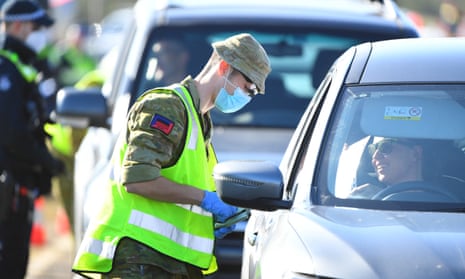Australians are increasingly anxious about the threat of the coronavirus, and public approval of the way Scott Morrison and Daniel Andrews have handled the pandemic slipped during the onset of a second wave of infections, according to the latest Guardian Essential poll.
The latest survey of 1,054 respondents shows community concern about Covid-19 increased from a quarter of the sample last month to 36% in the latest data.
Unsurprisingly given recent events, concern is highest in Victoria (46% of state respondents reported feeling very concerned) and New South Wales (42%), with state health authorities now battling a cluster of infections linked to the outbreak at the Crossroads Hotel in Casula. Voters remain relatively sanguine in other states.
While a majority of Australian voters remain supportive of government responses to the pandemic, public approval has slipped from the highs of last month.
In June, 70% of the sample gave the Morrison government the thumbs up, and that’s down to 64%. In New South Wales, approval has gone from 70% to 63% in a month.
The decline is more precipitous in Victoria, the centre of the new outbreak. In June, 65% of the sample gave the Andrews government a positive rating for the pandemic response, and that’s down to 49% this week. Only 17% of the sample said the state government is doing a very good job.
While Australian governments flattened the curve of infections during the first wave, success that gave the community confidence, voters are now dealing with the blow of rising infection rates triggering a second major lockdown in Melbourne. There is also uncertainty in the community about how long the fiscal support rolled out by the Morrison government during the crisis will continue.
Ahead of an economic update on 23 July, the government is signalling there will not be an abrupt withdrawal of support next week given the deterioration in the public health outlook.
The treasurer Josh Frydenberg was explicit on Monday, telling reporters the lockdown in Victoria would be “harsh on businesses and households” and it was safe to assume people “hurting through Covid will continue to benefit from the government’s support”.
While some in the government have expressed concern about the substantial costs of the pump prime during the pandemic, the government has also faced pressure from business and community groups to maintain key supports like the jobkeeper wage subsidy and the jobseeker payments rather than impose a fiscal cliff.
Polling in June showed that Australians were worried that businesses would be put at risk if the Morrison government withdrew support when Australia could face a second wave. Both the International Monetary Fund and the Reserve Bank have argued that ongoing stimulus will be necessary to ensure economies recover from the shock of the pandemic.
Voters in the Guardian Essential survey were asked this week whether they approved or disapproved of Morrison’s performance as prime minister and Anthony Albanese as federal Labor leader.
There was a negative movement for Morrison inside the poll’s margin of error, which is plus or minus 3%. The prime minister’s approval rating this month is 63% compared to 65% in June. Morrison’s disapproval is 27%, up one point in the month. It is the first negative movement for Morrison in five months.
Albanese had a positive movement inside the margin of error. His approval rating is 44% compared to 43% in June. His disapproval this month was 28%, down two points from last month. Albanese still attracts a high proportion of “don’t know” responses to that question in the survey (28% compared with Morrison’s 10%), and while Morrison is the darling of the Coalition base, Albanese has less rusted on support (90% to 65%).
Consistent with other movements in this month’s survey, Morrison remains clearly ahead of Albanese as preferred prime minister (50% to 27%), but the Labor leader gained ground over the month. In June, Morrison was ahead 53% to 23%. A quarter of the sample say they don’t know who they think would make a better prime minister.
